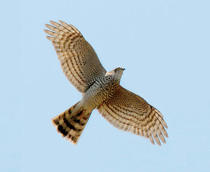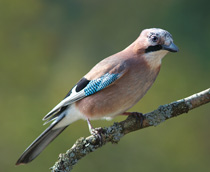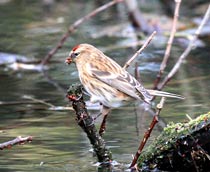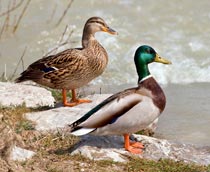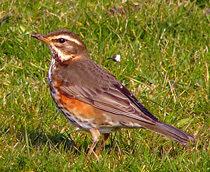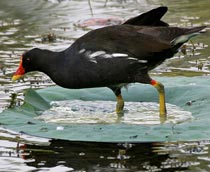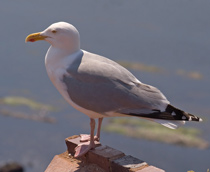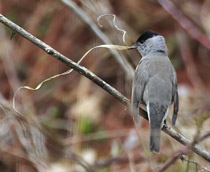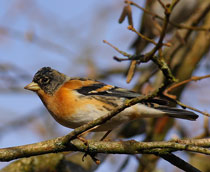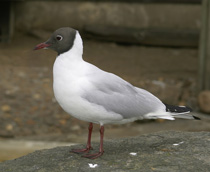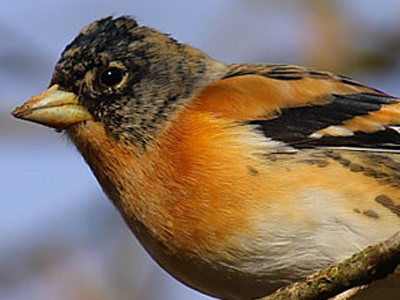
In Europe, this bird forms large flocks in the winter, sometimes with thousands or even millions of birds in a single flock.
British Birds - Garden Birds 04 - Uncommon
This quiz contains the birds that occupy positions 31 to 40 in "The Big Garden Birdwatch" of 2011. The event is organized by the RSPB each spring and gets people all over the country reporting on the birds in their garden. See if you can identify the following garden birds - these are the lesser known so get your thinking cap on!
To read more about the individual birds go to British Garden Birds where you will find a wealth of information on a friendly website dedicated to helping garden birdwatchers.
To see a larger image, click on the picture.
1 .
What is the name of this bird?
Hen Harrier
Red Kite
Western Marsh Harrier
Eurasian Sparrowhawk
- Group: Buzzards, Kites and allies
- Binomial: Accipiter nisus
- Order: Falconiformes
- Family: Accipitridae
- Status: Resident Breeder And Passage Migrant
- The female is up to 25% larger than the male – one of the largest differences between the sexes in any bird species.
- The species features in Teutonic mythology.
2 .
What is the name of this bird?
Eurasian Jay
Rook
Common Raven
Hooded Crow
- Group: Crows and allies
- Binomial: Garrulus glandarius
- Order: Passeriformes
- Family: Corvidae
- Status: Resident Breeding Species
- Shy woodland birds, rarely moving far from cover.
- Famous for their acorn feeding habits and in the autumn you may see them burying acorns for retrieving later in the winter.
3 .
What is the name of this bird?
Brambling
Eurasian Linnet
European Goldfinch
Lesser Redpoll
- Group: Finches
- Binomial: Carduelis cabaret
- Order: Passeriformes
- Family: Fringillidae
- Status: Resident Breeding Species
- It is a sociable bird which usually forages in flocks.
- Breeding pairs form in late winter. The breeding territory and several pairs will often nest close together in a loose colony.
4 .
What is the name of this bird?
Mallard
Red-breasted Merganser
Common Eider
Common Pochard
- Group: Ducks, Geese and Swans
- Binomial: Anas platyrhynchos
- Order: Anseriformes
- Family: Anatidae
- Status: Resident Breeder, Winter Visitor, And Naturalised Releases
- The commonest and most widespread duck.
- Seen even in urban areas.
- Is the ancestor of almost all of the varieties of domestic ducks.
5 .
What is the name of this bird?
Mistle Thrush
Redwing
European Robin
Northern Wheatear
- Group: Thrushes
- Binomial: Turdus iliacus
- Order: Passeriformes
- Family: Turdidae
- Status: Winter Visitor
- They roam across the UK's countryside, feeding in fields and hedgerows.
- Rarely visit gardens, except in the coldest weather when snow covers the fields.
- Only a few pairs nest in the UK.
6 .
What is the name of this bird?
Common Moorhen
Lapwing
Coot
Little Ringed Plover
- Group: Rails, Crakes and Coots
- Binomial: Gallinula chloropus
- Order: Gruiformes
- Family: Rallidae
- Status: Resident Breeding Species
- Tend to be solitary.
- Though they appear placid, fighting is common and often prolonged.
- Each bird strikes the other violently with the feet and even attempts to push or drag them underwater.
7 .
What is the name of this bird?
European Herring Gull
Black-headed Gull
Lesser Black-backed Gull
European Shag
- Group: Gulls
- Binomial: Larus argentatus
- Order: Charadriiformes
- Family: Laridae
- Status: Resident Breeding Species
- The most abundant and best known of its kind along the shores of western Europe.
- Also abundant around inland garbage dumps, and some have even adapted to life in inland cities.
8 .
What is the name of this bird?
Blackcap
Cetti's Warbler
Wood Warbler
Eurasian Reed Warbler
- Group: Old World Warblers
- Binomial: Sylvia atricapilla
- Order: Passeriformes
- Family: Sylviidae
- Status: Resident Breeding Species & Summer Visitor
- The alarm call, 'tacc', sounds like two pebbles striking one another.
- Its song is a rich and varied warble, starting with a chattering and finishing with a flourish of flute-like notes.
9 .
What is the name of this bird?
Brambling
European Goldfinch
Lesser Redpoll
European Greenfinch
- Group: Finches
- Binomial: Fringilla montifringilla
- Order: Passeriformes
- Family: Fringillidae
- Status: Winter Visitor
- This species is almost entirely migratory.
- In Europe, it forms large flocks in the winter, sometimes with thousands or even millions of birds in a single flock.
- It has been called Cock o' the North.
10 .
What is the name of this bird?
Great Cormorant
Great Black-backed Gull
Black-headed Gull
Common Gull
- Group: Gulls
- Binomial: Larus ridibundus
- Order: Charadriiformes
- Family: Laridae
- Status: Resident Breeding Species
- Sociable, quarrelsome, noisy birds, usually seen in small groups or flocks.
- The eggs are considered a delicacy and eaten hard boiled.
- The character 'Kehaar' in Watership Down is this bird.
**Unlimited Quizzes Await You! 🚀**
Hey there, quiz champ! 🌟 You've already tackled today's free questions.
Ready for more?
Ready for more?
🔓 Unlock UNLIMITED Quizzes and challenge yourself every day. But that's
not all...
not all...
🔥 As a Subscriber you can join our thrilling "Daily Streak" against other
quizzers. Try to win a coveted spot on our Hall of Fame Page.
quizzers. Try to win a coveted spot on our Hall of Fame Page.
Don't miss out! Join us now and keep the fun rolling. 🎉
**Unlimited Quizzes Await You! 🚀**
Hey there, quiz champ! 🌟 You've already tackled today's free questions. Ready for more?
🔓 Unlock UNLIMITED Quizzes and challenge yourself every day. But that's not all...
🔥 As a Subscriber you can join our thrilling "Daily Streak" against other quizzers. Try to win a coveted spot on our Hall of Fame Page.
Don't miss out! Join us now and keep the fun rolling. 🎉





